The Munduruku Amerindian nation in the Brazilian Amazon, is resisting the construction of a number of hydropower mega-dam projects, led by the Brazilian Government, which will deeply affect the Munduruku’s environment and livelihoods, and put at risk their existence. As Jairo states in his letter:
All of us indigenous peoples are outraged with the behaviour of government representatives who destroy our science and our history, who thrive on the disappearance of our political organization, killing us in our own territories and tarnishing the soil with blood.
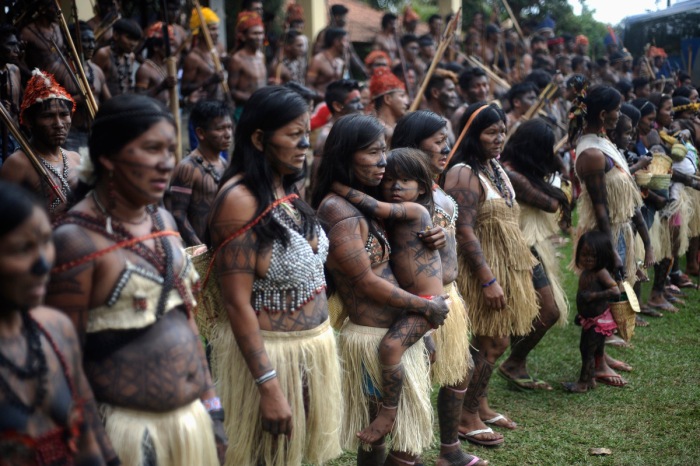
Munduruku Indians in Brasilia campaigning against the construction of the controversial Belo Monte dam on the Xingu River in the Amazon. Source: Lunae Parracho / Reuters.
Letter from the Munduruku: Fundamental Rights
For a long time, we indigenous peoples of Brazil have suffered discrimination from the state government. It appears that we, as a society, with our way of life, are not taken seriously: we are disregarded by Brazilian society, which considered itself to be more ‘developed’, ‘civilized and ‘organized’. The state government declares that it is the authority that protects the rights of the original peoples who have existed in those areas for thousands of years; but its political system is not democratic. In fact, it perpetrates colonization. It takes our territories by force, while also taking away our right to defend ourselves. Without the land rights that guarantee our survival, we are left with only the right to die. Our blood shed on this sacred land cries out for justice until the new millennium.
We descendants of our ancestors, who survived and still survive these days, are still subjected to genocide. We have been progressively overtaken, but today in a silent and even more destructive way, by using words on papers followed up by loud voices and heavy weapons. The silent weapon is the Law they have created, that threatens the rights of all citizens including the indigenous peoples. And military force is used to protect those who violate the rights of citizens, including those that should be protected by Artistic and Cultural Patrimony laws and the Rights over Traditionally Occupied Territories.
We are going to resist until the last drop of blood is spilled, while we are looking for someone that will offer us rescue. Our shouts are being ignored. How many letters have been sent to the UN, the body responsible for protecting human rights against violations? It is not only human rights that are damaged, but the existing laws of the Federal Constitution. There are also environmental laws, which recognize various forms of life: biological and genetic, including animal life. When the weather changes, it also interferes in the way the nature behaves.
Inside this ecosystem, we give our contribution in the geographic space we create. All that exists on the Earth is our heritage. All cosmology, all science, all knowledge is our understanding of our world, is intangible patrimony. The writing language is based in the creation of the world, since above all we know what we are talking about. And nature understands us. For this reason, nature keeps us in harmony, because we are not damaging it, not being aggressive to it, neither do we violate it.
Our history teaches us that all this knowledge is registered in the memory of our ancestors. No library has never failed; it is still alive. It is where we look to for scientific knowledge in our research. It is impossible to erase the stories of our ancestral memory.
We consider the Amazon region as human patrimony. Everyone should protect it, since it is the last source of life on our planet. We depend on it. But why is it that humanity is not conscious of it? The river is our only survival source, a free river that is now planned to be obstructed, for a dam with turbines that will disturb the fish deep under water with high frequency sonic vibrations. We know that it will cause environmental problems for the aquatic animals. It is not possible to accept such destruction of the fish in the river, without thinking about other more serious problems.
Environmental crime is not a crime for those who kill nature; it is only a crime for those who preserve it. Where is the logic to this, when laws are created telling us to preserve nature?
Everyone should have the responsibility to protect life, without the need of laws, because we know that nature was not created to be destroyed, but to be looked after. Everyone must be very careful, to be truly aware. And everyone should be touched by it. Nature is essential to all of us.
The destroyers that kill nature are not even punished for their criminal acts, and are continuing to devastate the environment. Life for us is sacred, and we respect it. It is life that teaches us to act in correct, healthy and harmonious ways.
All of us indigenous peoples are outraged with the behaviour of government representatives who destroy our science and our history, who thrive on the disappearance of our political organization, killing us in our own territories and tarnishing the soil with blood.
Where are the human rights to guarantee the respect of fundamental rights? These are Brazilian Constitutional Rights!
Our battle cry Saweee means: Enough! Respect our rights, let us live in our traditional way and stop interfering!
The Munduruku People
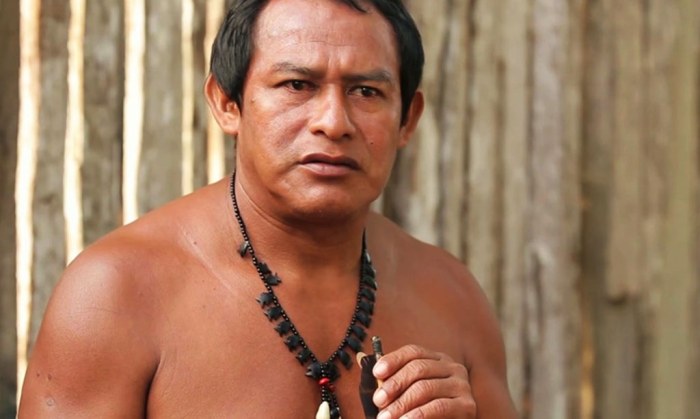
Munduruku teacher and political leader Jairo Saw. Source: mortedotapajos.tv.
Carta dos Munduruku: Direitos Fundamentais
Há muito tempo nós, povos indígenas, somos discriminados pelo estado. Parece que nós, como povo, com nossa forma de viver, não somos levados a sério: somos desconsiderados pela outra sociedade que se diz supostamente mais “evoluída, civilizada e organizada”. O estado diz saber proteger o direito dos povos que existem há milhões de anos, mas essa política não é democrática e ainda perpetua a colonização: toma nossos territórios à força, sem que se garanta o direito de nos defendermos. Sem direito à terra para sobreviver, temos o direito apenas de morrer. Nosso sangue derramado no chão sagrado clama por justiça até o novo milênio.
Nossos descendentes, os que sobreviveram e sobrevivem até hoje, continuam sendo alvo de genocídios. Avança-se cada vez mais sobre eles, de maneira silenciosa e ainda mais destruidora, por meio do uso do poder do papel seguido de vozes e de armamentos pesados. A arma silenciosa é a Lei que criaram, que fere os direitos dos cidadãos comuns, inclusive os dos indígenas. Então usa-se a força militar para proteger aos que violam os direitos dos cidadãos, inclusive a lei da proteção ao patrimônio artístico cultural e o direito ao território ocupado tradicionalmente.
Estaremos resistindo até a última gota de sangue, procurando alguém que nos estenda a mão para nos socorrer. Nossos gritos não são ouvidos. Quantas e quantas cartas foram enviadas à ONU, que diz promover os direitos humanos sobre a violação de direitos. Não se fere apenas os direitos humanos mas, também, agride-se as leis existentes na Constituição Federal. Há também as leis ambientais, que reconhecem várias formas de vidas: biológicas e genéticas, incluindo vidas animais. Quando o clima muda, interfere também na forma como a natureza age.
Dentro desse ecossistema, temos a nossa contribuição na formação do espaço geográfico. Tudo o que existe na terra é herança nossa. Toda cosmologia, toda ciência, toda formação do conhecimento são nosso saber, o patrimônio imaterial. A escrita é baseada na criação do mundo, pois sobre tudo o que falamos sabemos a que estamos nos referindo. E a natureza nos compreende. Por essa razão, ela nos mantém em harmonia, porque não a degradamos, não a agredimos, nem a violentamos
Nossa história nos ensina que todo esse saber está registrado na memória de nossos antepassados, que nenhuma biblioteca nunca esgotou e que continua vivo. É fonte para buscarmos o conhecimento científico que serve para nossas pesquisas. Não é possível apagar as nossas histórias memoriais.
Consideramos que a Amazônia é o patrimônio da humanidade. Todos devem protegê-la, pois é a última fonte para nossa vida aqui no planeta. Estamos dependendo dela. Então, por que a humanidade não está consciente disto? O rio é a única forma de sobrevivência nossa, um rio livre que querem agora barrar, dando lugar a uma represa, cujas turbinas vão incomodar os peixes no fundo do rio por meio de vibrações sonoras de alta frequência. Entendemos que isso causa impacto ambiental aos animais aquíferos. Não dá para aceitar tamanha destruição dos peixes que estão no fundo do rio sem pensar em outros problemas graves.
O crime ambiental não é crime para aqueles que matam a natureza, só é crime para aqueles que a conservam. Onde está a lógica da proteção, quando se criam leis que dizem ter para manter?
Nós temos essa obrigação de proteger sem precisar fazer leis, porque sabemos que a natureza não foi feita para ser destruída, mas sim para ser zelada. Temos de ter todo o cuidado, uma verdadeira consciência. Temos que ser sensibilizados. A natureza é essencial a todos nós.
Os destruidores que matam a natureza sequer são punidos por seus atos criminosos e continuam devastando o meio ambiente. A vida para nós é sagrada, pois nós temos respeitado ela. É ela que nos ensina a agir de forma correta, sadia e harmoniosa.
Todos nós, povos indígenas, estamos revoltados com as atitudes de nossos governantes que destroem nossa ciência e nossa história, que querem que desapareça a nossa política, matando-nos em nosso próprio território e manchando a terra de sangue.
Então cadê os direitos humanos para que se faça respeitar os direitos fundamentais? Direitos esses que são constitucionais.
Nosso grito de Saweee é: Basta! Respeitem os nossos direitos, deixem-nos viver de acordo com a nossa cultura e não interfiram!
Povo Munduruku


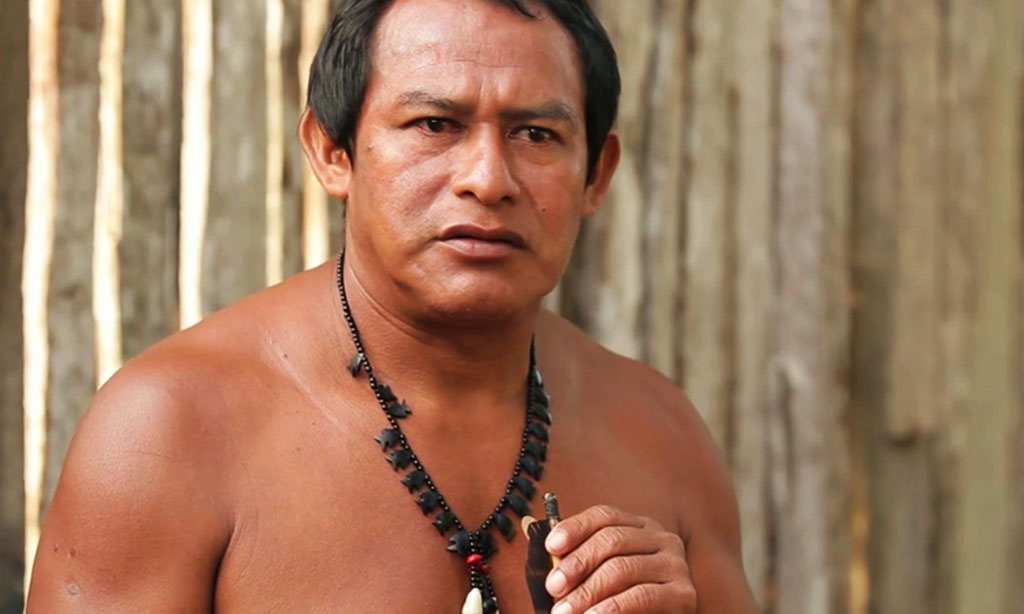
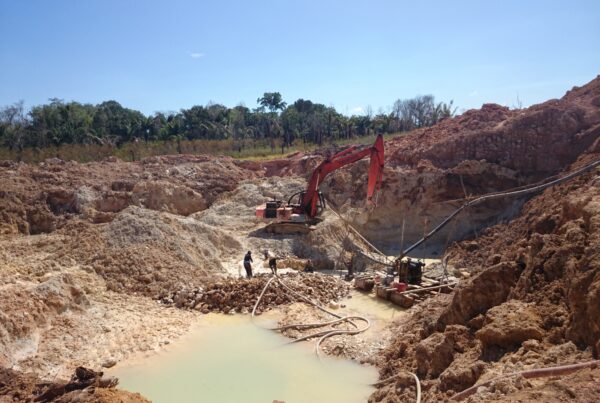
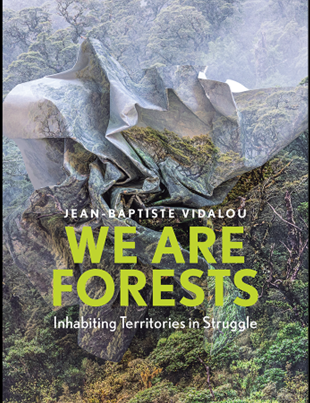
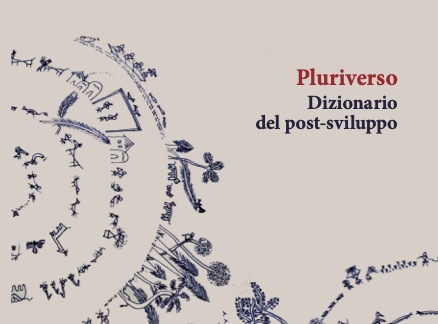
Reblogged this on Suebian Wanderer.